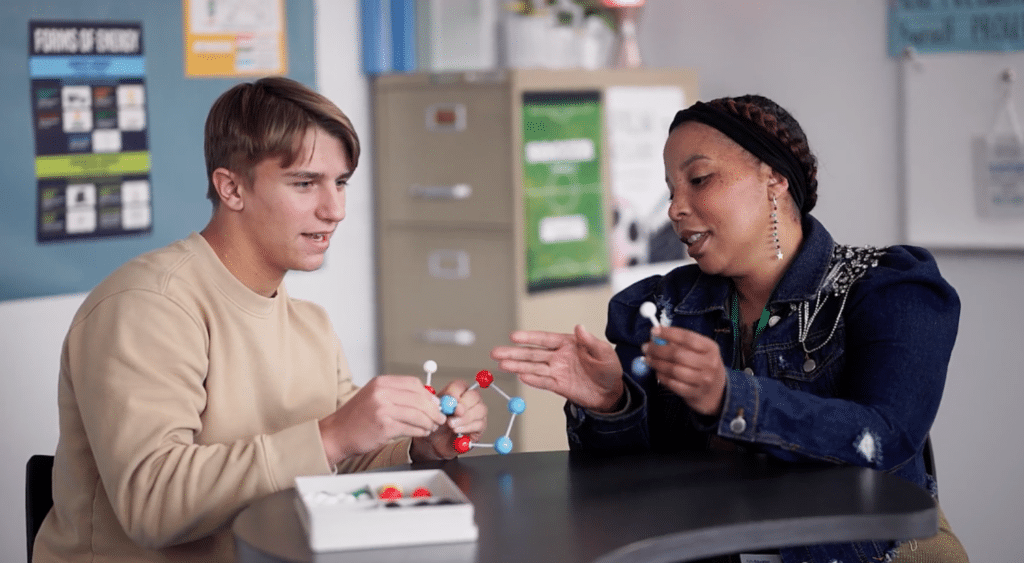How to become a paraprofessional—do I need a parapro test?

Looking to make a difference in your community? School districts across the country have permanent and substitute paraprofessional jobs posted. They are looking for people who want to do the rewarding work of supporting students with special needs.
If that’s you, you might wonder whether schools require special credentialing or a paraprofessional test? What exactly are the qualifications to become a paraprofessional?
At Kelly Education, we prefer to call this role “paraeducator” because (like paramedic or paralegal) it reflects the professionalism that aligns with the field. School districts often call this role by other names, like paraprofessional, parapro, or teaching aide.
When hiring, our recruiters help candidates understand their state’s paraprofessional requirements so they can easily navigate the process which can take several weeks. The earlier you begin, the sooner you’ll be in the classroom. Let’s look at the steps more closely.
Certification, licensing, authorization, and permits.
Specific requirements for substitute paraprofessional positions vary significantly by state and district. At the most basic level, candidates should have strong interpersonal and communication skills and some familiarity with classroom instruction techniques.
Most states don’t require substitute paraprofessionals to have an official certification. Seventeen states offer a paraprofessional certification or permit. In some cases, a certification program is voluntary. Certain states have a tiered certification program to accommodate a broader range of candidates. These formal credentials typically include education, training, and examination.
Be sure to read through your district’s paraprofessional job description. If you still have questions about specific paraprofessional credentials, speak with the district’s hiring manager or with your recruiter if your district partners with Kelly Education.
Education requirements.
A high school diploma is usually required to become a substitute paraprofessional. However, Title I schools may also require candidates to have more college coursework or take a paraprofessional test to show competency to work in schools. More on that coming up.
Education verification.
Candidates will submit official high school and college transcripts to verify their educational background. Even if you didn’t complete a college degree, submit proof of the highest level of education you completed. Some school districts pay more or have additional opportunities for those with higher levels of education.
To obtain your transcripts, request a copy from your high school or state boards of education. For college transcripts, you can likely make the request online through the registrar’s office. Be sure to allow at least a week for these requests. Most schools will charge a small processing fee between $10 and $15.
Do I need to take a paraprofessional test?
If you don’t have college hours and the district requires proof of basic competency, they may ask you to take a test to assess your skills—especially if the district is a Title I district. Then, they must adhere to federal regulations.
There are a few different paraprofessional tests. A common one is the ParaPro Assessment, which measures competency in and classroom application of reading, writing, and mathematics. Educational Testing Service (ETS) developed this one. They provide test-takers with helpful preparation materials. Your state and school district set the minimum score to pass. The registration fee is $85, and you may take the test remotely.
Note that many substitute paraprofessionals do NOT have to take a paraprofessional exam.
Experience.
Generally, you won’t need previous related work experience, though it will undoubtedly give you a hiring advantage if you do. For more specialized paraprofessional duties, such as supporting students with English as a Second Language (ESL) or working with students who have special needs, districts may ask for one year of previous experience working with those populations.
Background screening and fingerprinting.
All states require some level of background check and fingerprinting for individuals working directly with children. Depending on the school district, paraeducators or paraprofessionals may also need to pass a drug test. The job description should outline specific expectations regarding background screenings. Applicants are typically responsible for the cost of these background checks, and results may take up to two weeks to process.
All Kelly Education, our paraeducators will be checked against the National Sex Offender Registry.
Health screenings.
Review the paraeducator job posting or check with the human resources team to determine if your school district mandates a health assessment. It’s also common for school staff to complete a tuberculosis (TB) screening and physical as part of the hiring process. You may support students with physical disabilities, so your roles might include light to moderate physical activity.
Training.
According to the federal Individuals with Disabilities Education Act (IDEA), paraprofessionals who work with children with disabilities must undergo training. Individual states can set their own training criteria for these roles. In many cases, the school district will provide some form of training for substitute paraprofessionals, whether pre-hire or during the orientation period.
It’s a great idea for substitute paraprofessionals to pursue CPR and First Aid certification. Even if optional for the role, these emergency response competencies are important for student safety. Some employers provide First Aid courses for free. Otherwise, these certifications typically cost around $50.
Kelly Education requires applicants to complete a pre-hire training called ParaSmarts. It outlines role-specific duties and best practices. Kelly Education paraeducators also complete a one-hour New Hire Orientation that summarizes our policies and your school district’s specific regulations.
Employment verification.
All school employees, even substitutes, must prove eligibility to work in the United States. To do so, you will need to complete an I-9 form with valid identification credentials with your hiring manager.
Become a substitute paraeducator with Kelly Education.
If you or someone you know is interested in paraprofessional or substitute teaching jobs, fill out our brief interest form, and one of our recruiters will contact you to answer your questions. We’ll also share more about opportunities to become a substitute teacher or support staff with one of our school district partners.
We also have an entire library of helpful articles for paras and school educators. They include:
*Information subject to change. This is a general guideline as of August 2024. School districts may have additional requirements, in addition to state requirements.

View Related: Applying for jobs Article
You might like
Find your next job
Discover thousands of temporary, full-time, and remote jobs for beginning and experienced job seekers.


